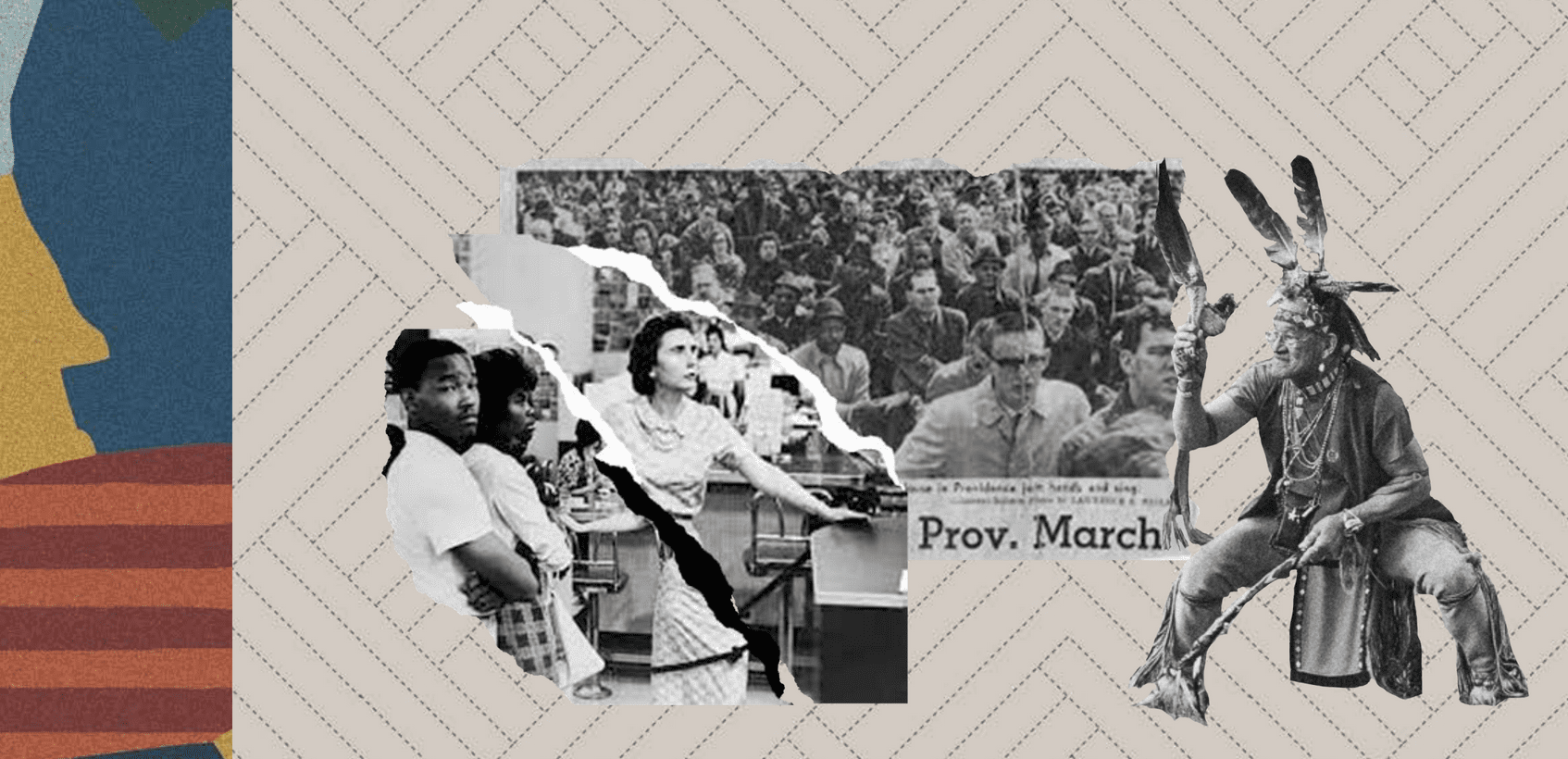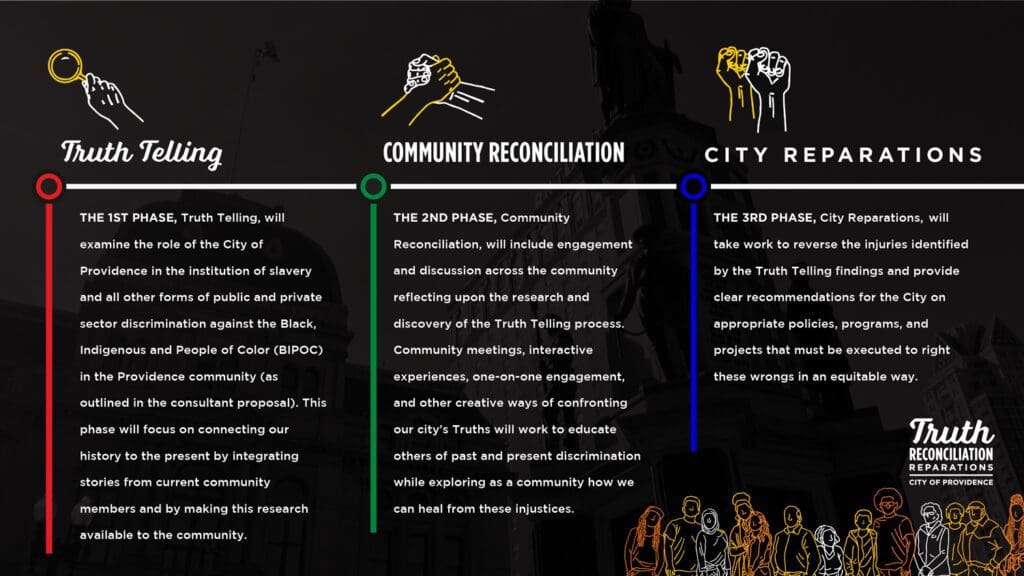Search Posts
Recent Posts
- Vinny Paz to be inducted TODAY into the International Boxing Hall of Fame – CES Boxing June 7, 2025
- In the News… quick recap of the week’s news (6.7.25) June 7, 2025
- Burn with Kearns: Strong without the spend: How scraps became strength tools – Kevin Kearns June 7, 2025
- Rhode Island Weather for June 7, 2025 – Jack Donnelly June 7, 2025
- How to advocate for threatened properties: The Heritage Alliance of Pawtucket June 7, 2025
Categories
Subscribe!
Thanks for subscribing! Please check your email for further instructions.

Updated: Providence’s Truth-Telling, Reconciliation, Reparations Project – next steps
Updated, 2pm, 2-28-2022:
“Here in Providence, we are leading the way on undertaking this difficult – but critical – work to acknowledge and address racial injustice that impacts our community,” said Mayor Jorge O. Elorza. “Today, I am proud to be alongside our partners and community members to share another milestone of this three-phase process, the Framework for Reconciliation. By engaging those who have been directly impacted by actions outlined during our Truth Telling phase, this framework demonstrates that history isn’t something that just happened in the past but is actively shaping present-day outcomes for African heritage and Indigenous Providence residents.”
Reconciliation is the second phase of a multi-year, three-part Truth-Telling, Reconciliation and Reparations process, first announced through a community-driven Executive Order signed by Mayor Elorza in July 2020. The Providence Cultural Equity Initiative, Roger Williams University and Providence Public Library partnered with the City and AAAG Truth-Telling and Reconciliation Subgroup, comprised of nearly 20 community members from the larger African American Ambassador Group, to launch a framework for reconciliation which included several months of engagement and discussion across the community, reflecting on the information discovered and the research compiled in A Matter of Truth.
“It was an honor and a privilege to be selected by Mayor Elorza and the African American Ambassadors Group to lead the reconciliation phase of this very important initiative,” said PCEI CEO and Founder Raymond Two Hawks Watson. “Our coalition’s goals were to humanize and reframe the discussion around reparations in the City of Providence, provide avenues to increase public access to and engagement with the A Matter of Truth report, and create tools to sustain and promote the process of reconciliation in Providence and beyond. We are excited to see what the community will achieve by employing the reconciliation framework that we have developed.”
The Framework for Reconciliation was piloted in the neighborhoods of Fox Point, Lippitt Hill, Upper South Providence and West Elmwood, and outlines a model and proof of concept to continue reconciliation in perpetuity. The framework is informed by deep community engagement, including 378 survey responses, 16 lead stakeholders with generational personal, familial, and community ties to four focused neighborhoods, 29 interviews of community members and engagement with community members across several African and Indigenous Heritage community events. The process included the development of a multimedia initiative to directly connect more individuals with the A Matter of Truth report, including a website featuring documentary interviews and reconciliation framework report.
“Our framework seeks to center the voices and perspectives of particular communities affected by particular injustices,” said Roger Williams University Assistant Professor Brian Hendrickson. “The City of Providence is now well positioned to initiate a broader series of community conversations to complement and inform a focused, evidence-based approach to reparations. We hope others will join us in realizing and extending this vision for racial healing and community transformation.”
In addition, Mayor Elorza signed a community-driven Executive Order establishing the Providence Municipal Reparations Commission to address the injuries outlined in the Truth Telling and Reconciliation phases and provide clear recommendations to the City on appropriate policies, programs, and projects to begin repairing harm. The Commission will have 13 members, with seven members appointed by Mayor Elorza and six members appointed by the Providence City Council. Mayor Elorza announced the appointments of: NAACP Providence President Jim Vincent; PCEI CEO and Founder Raymond Two Hawks Watson; Lab Faculty at College Unbound Wanda Brown; President of Rhode Island Pride Rodney Davis; 25 Bough St CEO Lanre Ajakaiye; RISD Assistant Professor Jess Brown; and CEO of CareerDevs Computer Science Institute Arnell Millhouse.
“Two years ago and surrounded by our community members, we announced this comprehensive approach that would lead to reparations which has served as a model for other cities throughout the country,” said Mayor Jorge O. Elorza. “While we know the City alone cannot repair the full scope of harm, today’s action brings us another step closer to addressing the disparities our African heritage and Indigenous residents continue to face. I’m confident that this Commission of community leaders and advocates will provide invaluable insight into creating a path forward that’s right for our community.”
The Providence Municipal Reparations Commission will sunset in 90 days following the submission of a report outlining recommendations on municipal reparations to Mayor Elorza and the Providence City Council. The report will include, but is not limited to, an examination of reparation work being done in other cities and a summary of community engagement strategies throughout the City’s process, culminating in recommendations for reparations in Providence.
The Truth-Telling, Reconciliation and Reparations process was developed with the Mayor’s African American Ambassador Group, which has met at least three times a month for two years and serves as a direct line of communication between the community and the Administration. Those interested in engaging in the subcommittees of the AAAG are encouraged to complete this form.
To view the Framework for Reconciliation, click here. To read the Executive Order, click here. To learn more about the African American Ambassador Group, click here.
_____
Truth-Telling & Reconciliation – Proposing a Framework for the City of Providence will launch the next phase in the reconciliation and reparations work TODAY at 10:30am at the Bethel AME Church, 30 Rochambeau Avenue on the East Side of Providence.
Mayor Jorge Elorza will sign an Executive Order to proceed with the next phase. He will be joined by:
Brian Hendrickson – Roger Williams University
Keith Stokes – 1696 Heritage Group
Cheryl Taylor, Shawndell Burney-Speaks – African American Ambassador Group
Raymond Two Hawks Watson – Providence Cultural Equity Initiative
Community members
Three phases:

First, the City worked to identify the Truth by examining the role of the State of Rhode Island and the City of Providence in supporting the institution of slavery, the genocide of Indigenous People, forced assimilation, and seizure of land, among other policies. As part of this first step, local and state laws were reviewed. This included a review of all other forms of public and private sector discrimination against people of African or Indigenous heritage and their descendants up to the present day.
Now that the collection of Truth is completed, findings are being used to begin the process of Reconciliation. Residents, organizations and institutions are beginning to engage in discussing these Truths, with the aim of appreciating the resiliency of the Black, Indigenous People and People of Color in Providence and to better understand the ways these injustices continue to impact residents today.
Through the last step of this process, Reparations, the City will take measures to reverse the injuries resulting from the Truth findings and advise what appropriate policies, programs, and projects may be executed based on recommendations that accomplish this mission. These will also work to address local laws and policies that continue to negatively impact Black, Indigenous People, and People of Color in Providence.
To read the report to date:
The project –
